2022

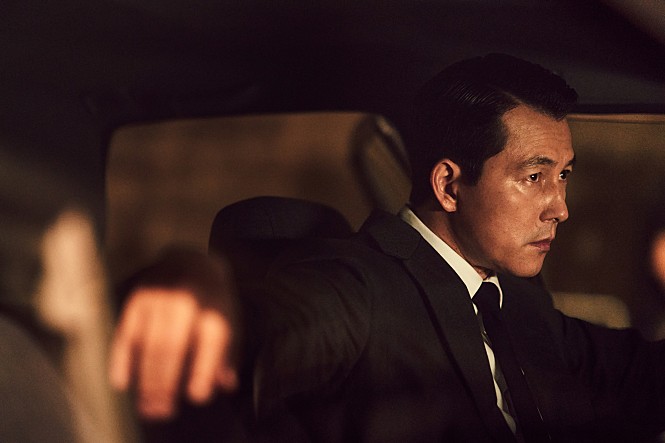
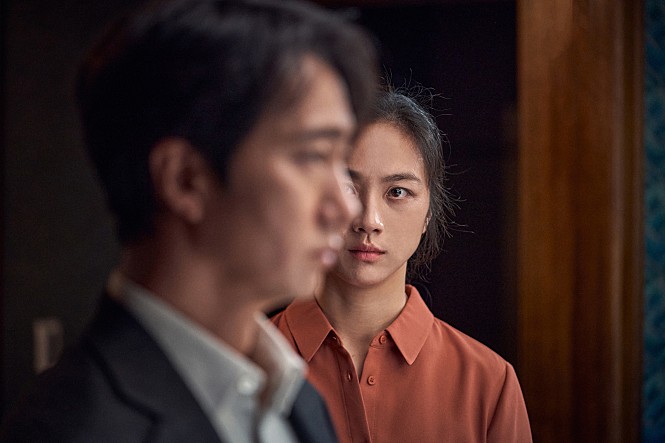
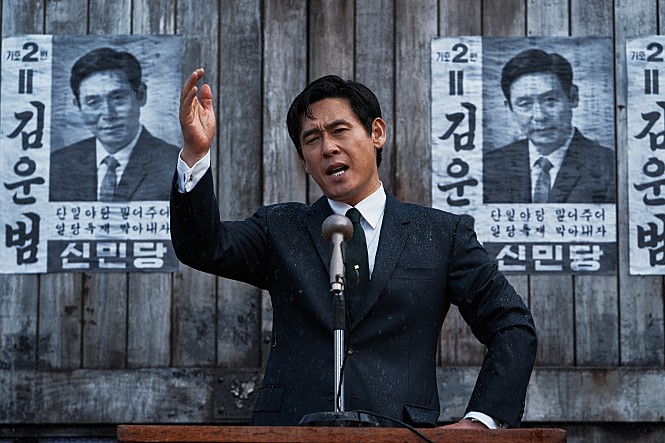
"Emergency Declaration", "Hunt", "Decision to Leave", "Kingmaker"
The box office recovered somewhat in 2022, after two years in which the industry was decimated by the pandemic. In particular, after many observers predicted that no Korean film would ever again top 10 million admissions, The Roundup -- a sequel to popular hit The Outlaws starring Don Lee a.k.a. Ma Dong-seok -- vaulted easily over the mark after its release in late May. Its total of 12.7 million admissions was roughly equal to that of the top 9 grossing Korean films of 2021.
Nor was it the only success story, with Hansan: Rising Dragon selling 7.3 million tickets and Confidential Assignment 2: International amassing just under 7 million. Nonetheless, when you look past these success stories to Korean cinema as a whole, the industry has not yet fully recovered to pre-pandemic levels. Several big-budget releases like Choi Dong-hoon's Alienoid and Han Jae-rim's Emergency Declaration performed far below expectations, and the lack of mid-sized successes in particular have kept industry watchers circumspect about the near future.
In terms of critical reception, Park Chan-wook's Decision to Leave has captivated many viewers around the world since its premiere at Cannes, and local critics were pleasently surprised by Squid Game lead actor Lee Jung-jae's directorial debut Hunt. Hong Sangsoo's The Novelist's Film picked up a Grand Jury Prize at the Berlin International Film Festival. And independent cinema continues to turn out new talent as well, such as Kim Se-in's The Apartment with Two Women and Park Song-yeol's Hot in Day, Cold at Night.
Reviewed below: Special Delivery (Jan 12) - Kingmaker (Jan 26) - Decision to Leave (Jun 29) - Body Parts (BiFan review) - In Dream (BiFan review) - Woman in the White Car (BiFan review) - Confession (Oct 26) - The Apartment with Two Women (Nov 10) - The Night Owl (Nov 23).
| Korean Films | Admissions | Release | Revenue | |
|---|---|---|---|---|
| 1 | The Roundup | 12,693,322 | May 18 | 131.3bn |
| 2 | Hansan: Rising Dragon | 7,264,648 | Jul 27 | 73.7bn |
| 3 | Confidential Assignment 2: International | 6,982,840 | Sep 7 | 70.6bn |
| 4 | Hunt | 4,352,394 | Aug 10 | 44.6bn | 5 | Hero | 3,266,549* | Dec 21 | 32.2bn |
| 6 | The Night Owl | 3,222,767 | Nov 23 | 31.8bn | 7 | The Witch Part 2: The Other One | 2,806,501 | Jun 15 | 28.9bn |
| 8 | Emergency Declaration | 2,058,794 | Aug 3 | 20.9bn |
| 9 | 6/45 | 1,980,773 | Aug 24 | 19.8bn |
| 10 | Decision to Leave | 1,893,013 | Jun 29 | 19.6bn |
| All Films | Admissions | Release | Revenue | |
|---|---|---|---|---|
| 1 | The Roundup (Kor) | 12,693,322 | May 18 | 131.3bn |
| 2 | Avatar: The Way of Water (US) | 10,801,003* | Dec 14 | 137.6bn |
| 3 | Top Gun: Maverick (US) | 8,177,452 | Jun 22 | 87.8bn |
| 4 | Hansan: Rising Dragon (Kor) | 7,264,648 | Jul 27 | 73.7bn |
| 5 | Confidential Assignment 2: International (Kor) | 6,982,840 | Sep 7 | 70.6bn |
| 6 | Doctor Strange in the Multiverse of Madness (US) | 5,884,595 | May 4 | 62.6bn |
| 7 | Hunt (Kor) | 4,352,394 | Aug 10 | 44.6bn | 8 | Hero (Kor) | 3,266,549* | Dec 21 | 32.2bn |
| 9 | The Night Owl (Kor) | 3,222,767 | Nov 23 | 31.8bn |
| 10 | Jurassic World: Dominion (US) | 2,837,410 | Jun 1 | 29.2bn |
* Includes tickets sold in 2023. Revenue is in Korean currency (US$1=~1300 won).
Source: Korean Film Council (www.kobis.or.kr).
Seoul population: 9.9 million
Nationwide population: 51.8 million
Who can resist the idea of a movie starring Park So-dam -- who so memorably played Ki-jung/Jessica in Bong Joon Ho's Parasite -- as a laconic speedster who flouts gangsters and drives circles around the police? Park plays Eun-ha, whose official place of employment is an automotive junkyard in Busan, working for a world-weary boss played by Kim Eui-sung (Train to Busan). But her driving skills make her the most essential component of an underground business that promises to deliver anything -- goods, people, contraband -- that the postal service won't handle.
One day the company is contacted by a man on the run from the police because of his involvement in a massive gambling scam. The client asks for him and his young son to be driven to a port so that they can flee the country, but when Eun-ha arrives at the meeting point, the boy is alone, running from a pack of hired thugs. Soon she and the boy are fleeing for their lives, with a corrupt detective (Song Sae-byeok) in pursuit, determined to rub them out.
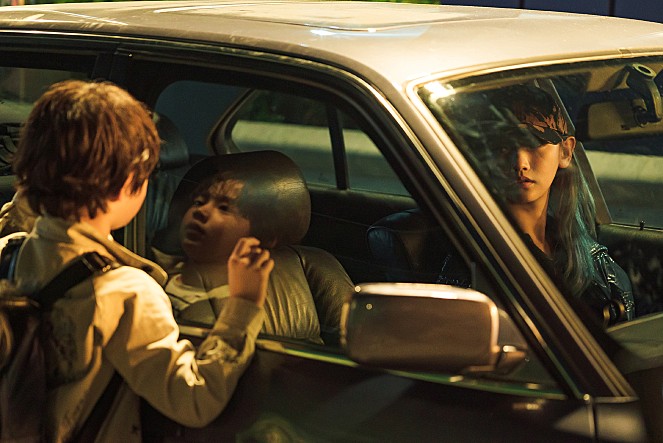 Special Delivery, by third-time director Park Dae-min (Private Eye, Seondal: The Man Who Sells the River) is centered around two staples of commercial cinema: the car chase, and the child-in-peril narrative. The car chases are dynamic and consistently entertaining, although I will say that they don't contain quite the visceral force of the brief but unforgettable car chase in Hostage: Missing Celebrity (2021), for example (i.e., Korean cinema is capable of producing better.) But where Special Delivery succeeds is in creating narrative momentum to go along with the spectacle. Inserting the young boy into this story does indeed boost the tension, in part thanks to the charismatic performance by Jeong Hyeon-jun (who is none other than the actor who played Da-song, Jessica's pupil, in Parasite). As the action moves across the Korean peninsula and eventually back to Busan, all but the most jaded viewers will find themselves caught up in the story.
Special Delivery, by third-time director Park Dae-min (Private Eye, Seondal: The Man Who Sells the River) is centered around two staples of commercial cinema: the car chase, and the child-in-peril narrative. The car chases are dynamic and consistently entertaining, although I will say that they don't contain quite the visceral force of the brief but unforgettable car chase in Hostage: Missing Celebrity (2021), for example (i.e., Korean cinema is capable of producing better.) But where Special Delivery succeeds is in creating narrative momentum to go along with the spectacle. Inserting the young boy into this story does indeed boost the tension, in part thanks to the charismatic performance by Jeong Hyeon-jun (who is none other than the actor who played Da-song, Jessica's pupil, in Parasite). As the action moves across the Korean peninsula and eventually back to Busan, all but the most jaded viewers will find themselves caught up in the story.
As for Park So-dam, the cool reserve she shows in this film lies more on the surface, slightly different from what she showed in Parasite. She handles the physical demands of the role well (there are a few intense action scenes), and is a consistently intriguing and likable lead character. One of the film's highlights is the way she interacts with her boss, another tough character whose empathy is kept in reserve. The film's antagonist, in contrast, keeps very little in reserve: Song Sae-byeok portrays the detective Cho as an unstoppable force of almost pure evil. To be honest, the performance veers pretty much out of control, but in the end that doesn't make the film any less entertaining. Several of the supporting roles also stand out, particularly the brilliant Yeon Hye-ran (Black Light) as an intelligence officer, and Han Hyun-min, a model/TV star of African descent who grew up in Korea, in his first film role.
Special Delivery never attempts to subvert its genre, or deliver any social messages, despite some references to North Korea. It succeeds because of its energy, craftsmanship and charisma. More than anything, fans of Park So-dam will find much to enjoy in this fast-paced, breezy ride. (Darcy Paquet)
The presidential election of 1971 was a pivotal moment in South Korean history. Having taken power in a coup a decade earlier, President Park Chung Hee felt secure in his position and continued to stage direct presidential elections. But he never seriously considered the possibility that he might lose. In the 1971 campaign, when the opposition New Democratic Party made the surprise decision to nominate Kim Dae Jung, a charismatic speaker from the southwest region of the country, it was assumed that Park's political machine would cope with the challenge easily. But in the end, Kim very nearly won the election. Unnerved, within a year Park declared martial law and pushed through a new, draconian constitution that abolished direct presidential elections indefinitely. (Two and a half decades later, after South Korea embarked on its path to democratization, Kim Dae Jung would finally be elected president.)
Viewers watching Kingmaker will not hear any mention of Kim Dae Jung, but he is one of the two main characters in this story. His name, and the names of other well-known figures of that time period have all been changed. (It is risky in today's Korea to shoot films using real names.) Ultimately, however, this is little more than a fig leaf: viewers familiar with modern Korean history will easily recognize who is who, since the historical details all coincide, and even the performances echo the manner and behavior of the real-life politicians.
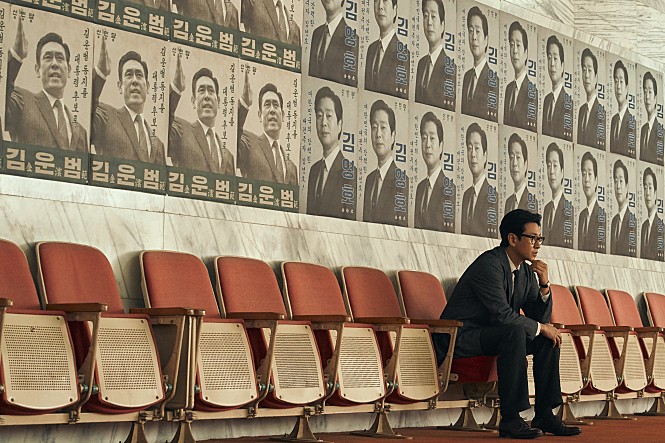 The film's second major character is a name from the shadows, rather than the spotlight of history. Eom Chang-rok was a real-life election strategist who worked closely with Kim Dae Jung, and who formed the inspiration for the character of Seo Chang-dae (played by Lee Sun-kyun of Parasite fame). Less is known about Eom and his motivations, which perhaps gave director Byun Sung-hyun and his co-writer Kim Min-soo more freedom in conceiving Seo. But what is known about Eom's life forms the basis of the character.
The film's second major character is a name from the shadows, rather than the spotlight of history. Eom Chang-rok was a real-life election strategist who worked closely with Kim Dae Jung, and who formed the inspiration for the character of Seo Chang-dae (played by Lee Sun-kyun of Parasite fame). Less is known about Eom and his motivations, which perhaps gave director Byun Sung-hyun and his co-writer Kim Min-soo more freedom in conceiving Seo. But what is known about Eom's life forms the basis of the character.
Seo Chang-dae is a man who wants more than anything to change the world, and when he comes across Kim Woon-bum (i.e., Kim Dae Jung) early in his career, he recognizes him as a politician with the vision and potential to bring about change. But Kim at this stage is floundering; he has lost four local elections in a row, and has failed to gain any meaningful degree of power. Seo believes that what stands in Kim's way are his ideals, and his insistence on playing fair. A more aggressive, or outright dishonest approach to campaigning could give Kim the power he needs to finally put his ideals into practice.
On a basic level, the conflict at the heart of Kingmaker is the age-old question: do the ends justify the means? Kim Woon-bum (played brilliantly by Sul Kyung-gu, who also starred in director Byun's breakout film The Merciless) recognizes a grain of truth to what Seo is telling him, and he decides to bring the strategist into his team. Electoral successes follow, but also tension. The changing relationship between these two men over time is the film's primary focus.
Kingmaker is an ambitious film, and its production design and cinematography are eye-opening. The viewer follows Kim Woon-bum's rise to prominence over the course of a decade, and the various spaces he inhabits and the challenges he overcomes are depicted in vivid detail. Kim's nomination at his party's convention in 1971 is like a film in itself, staged with an impressive sense of drama and scale. Meanwhile, throughout the story's development, the movie keeps posing questions to its audience about the nature of politics and ideals.
There are times, however, when abstract ideas seem to take precedence over flesh-and-blood characters. One suspects that the real-life Kim Dae Jung may have had a more nuanced understanding of the interplay between power and ideals, but because Kim Woon-bum represents a concept within the film, there remains something static about his character. To a certain extent, the same can be said of Seo, despite the dramatic shifts in his career and perspective. This is a weaker aspect of the film, and I would argue it also keeps us a bit distanced from the main characters.
Kingmaker is a vibrant portrait of an old political era, with themes that still apply to the present. It raises many questions, and (perhaps wisely) doesn't try to answer all of them. But as much as it gives its viewers much to think about, this film ultimately seems destined to divide its audience. It will delight and challenge some, and leave others cold. (Darcy Paquet)
Hae-joon (Park Hae-il, Memories of Murder, Hansan: Rising Dragon) is an elite police inspector based in Busan with an excellent reputation. Busy investigating a brutal axe-murder, he is saddled with a seemingly open-and-shut case, a suicide of a retired immigration officer Ki Do-soo (Yoo Seung-mok, Han Gong-ju, The Gangster, the Cop and the Devil), and a mountain-climbing enthusiast. He is immediately fascinated by the dead man's eye-poppingly beautiful Chinese wife Song Seo-rae (Tang Wei, Lust, Caution, Long Day's Journey into Night), originally an illegal migrant worker "rescued" by her late husband and apparently subject to physical and emotional abuse. Hae-joon dutifully stakes out and surveils Seo-rae, his increasingly affectionate and caring actions toward her negatively affecting his picture-perfect but bloodless marriage to nuclear scientist Jeong-an (Lee Jung-hyun, Night of the Undead, Peninsula). Partly to keep distance from Seo-rae, Hae-joon transfers himself to a police station in the small coastal down where his wife works, only to "accidentally" run into the mysterious woman with a new husband (Park Yong-woo, My Scary Girl, Hwayi: A Monster Boy) in tow. Is she a Black Widow after all, with another suspicious death for her spouse in the offing?
 The eleventh film helmed by the master cineaste (anyone else in the world you can think of who deserves this designation more?) Park Chan-wook, Decision to Leave has been compared to Hitchcock's Vertigo, due to its subject matter of a man infatuated with an unattainable object of desire. I think the director is entitled, at this mature stage of his career, to exhale a sigh of frustration at the persistent Hitchcockian references hurled at whatever new work he comes up with. For that matter, he is probably equally tired of the press or critics asking why his latest motion picture is so "non-violent" and "subdued," unlike Oldboy, etc. A more fruitful comparison in my view is with the films of postwar golden age Japanese masters, such as Kurosawa Akira and Masumura Yasuzo. The latter in fact concocted A Wife Confesses (1961) that also features a wife suspected of deliberately killing her husband during a mountain-climbing expedition. However, watching these two films side by side, I am struck more by the divergences in approaches and thematic concerns than any similarities in setup or plot developments. This can be said about all of Park's films (and Bong Joon Ho's, too), but his recent works no longer render themselves to easy spotting of homages and inter-textual references by even seasoned film fans, much less casual viewers. Whatever "influences" from the past cinematic masters have been thoroughly digested and processed into the flesh and blood of his own output.
The eleventh film helmed by the master cineaste (anyone else in the world you can think of who deserves this designation more?) Park Chan-wook, Decision to Leave has been compared to Hitchcock's Vertigo, due to its subject matter of a man infatuated with an unattainable object of desire. I think the director is entitled, at this mature stage of his career, to exhale a sigh of frustration at the persistent Hitchcockian references hurled at whatever new work he comes up with. For that matter, he is probably equally tired of the press or critics asking why his latest motion picture is so "non-violent" and "subdued," unlike Oldboy, etc. A more fruitful comparison in my view is with the films of postwar golden age Japanese masters, such as Kurosawa Akira and Masumura Yasuzo. The latter in fact concocted A Wife Confesses (1961) that also features a wife suspected of deliberately killing her husband during a mountain-climbing expedition. However, watching these two films side by side, I am struck more by the divergences in approaches and thematic concerns than any similarities in setup or plot developments. This can be said about all of Park's films (and Bong Joon Ho's, too), but his recent works no longer render themselves to easy spotting of homages and inter-textual references by even seasoned film fans, much less casual viewers. Whatever "influences" from the past cinematic masters have been thoroughly digested and processed into the flesh and blood of his own output.
Decision to Leave unfolds unhurriedly but not languidly, calm and collected but with just the right hint of razor-sharp edge that underlies the behaviors of its characters and complex plot developments. The exquisite little touches, one of Park's most identifiable traits— the frowning, cloudy sky "lensed" from the POV of a dead man's eye, crawling with flesh-scavenging ants: a crow feather that becomes a talismanic keep-sake for Hae-joon: the way he and Seo-rae, while a police interrogation, dine on rows of expensive sushi, meticulously and beautifully lacquer-boxed, and clean the table together with the practiced aplomb of a long-married couple— are all there, but this time they are completely subservient to the narrative of emotional (mis)communication between the two protagonists. At the core of this film is a love story, riffing as it does on the time-tried formulae of an unknowable femme fatale, yet ultimately moving into a realm no longer constrained by a commitment to genre-bound pleasures nor by an obligation for moral reflection or social criticism.
Tang Wei, preternaturally beautiful in early 40s, is of course at the center and front of all this. What is remarkable about Park's direction and Tang's performance is their effortless erasure of the usual boundaries between star-acting and the naturalistic state of "being there." Cleverly incorporating the motifs of mountain and sea from the ancient Chinese tome Shan Hai Jing into the dialogues and life stories of Seo-rae and Hae-joon, Park and his longtime screenwriting partner Jung Seo-gyung painstakingly sculpt the former into a character at once mythically enigmatic like a Gorgon, achingly and flinchingly vulnerable, and imbued with an impenetrable, steely resolve. Seo-rae is a member of that rare species that cannot be tamed or classified by the often-hypocritical conventions and codes of nationality and citizenship, of a "romantic relationship," and of the socially acceptable right and wrong. As was the case with The Handmaiden, but far more effectively this time, Park actively plays with the illusions of authenticity established by "linguistic competence," allowing Tang Wei to deliver a large corpus of her dialogue in Chinese, translated into almost comically literary or formal Korean via her smartphone app.
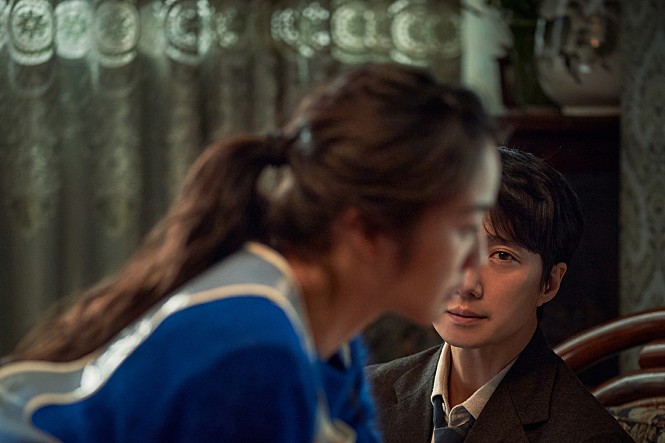 However, as magnificent as Tang Wei is, Decision to Leave really belongs to Park Hae-il, whose Hae-joon is a totally original character, unlike any "copper" ever portrayed in a Korean film. Park has been, like young Paul Newman in screen adaptations of Tennessee Williams, given many roles that run counter to his delicately chiseled features exuding intelligence and sensitivity— the ne'er-do-well former student activist in The Host, the borderline sexual harasser in Rules of Dating, the tightly coiled super-sniper in War of the Arrows, and so on. Here, Park is finally allowed to essay a fundamentally decent character caught between his empathy and compassion on the one hand and his professionalism and pride on the other: a cop whose entreaty to a vicious murderer to surrender himself is equal parts emotional manipulation and a genuine gesture of sympathy, one who cooks delicacies for his female companions, even though Seo-rae teasingly characterizes his dish of "Chinese-style" fried rice as qiguai ("bizarre"), and one who yearns for an authentic experience of soul-sharing companionship yet cannot escape his well-ordered universe of rational deduction and impartial justice.
However, as magnificent as Tang Wei is, Decision to Leave really belongs to Park Hae-il, whose Hae-joon is a totally original character, unlike any "copper" ever portrayed in a Korean film. Park has been, like young Paul Newman in screen adaptations of Tennessee Williams, given many roles that run counter to his delicately chiseled features exuding intelligence and sensitivity— the ne'er-do-well former student activist in The Host, the borderline sexual harasser in Rules of Dating, the tightly coiled super-sniper in War of the Arrows, and so on. Here, Park is finally allowed to essay a fundamentally decent character caught between his empathy and compassion on the one hand and his professionalism and pride on the other: a cop whose entreaty to a vicious murderer to surrender himself is equal parts emotional manipulation and a genuine gesture of sympathy, one who cooks delicacies for his female companions, even though Seo-rae teasingly characterizes his dish of "Chinese-style" fried rice as qiguai ("bizarre"), and one who yearns for an authentic experience of soul-sharing companionship yet cannot escape his well-ordered universe of rational deduction and impartial justice.
It is mainly through the gradual transfiguration of Hae-joon's psyche that we experience the film. And the two Parks, actor and director, entirely eschew the usual choices in characterizing Hae-joon: he is neither obstinately obsessed with Seo-rae, as indeed Scottie (James Steward) was with Madeleine (Kim Novak) in Vertigo: nor is he deliberately cold and unfeeling toward her, hiding some volcanic passion inside. Even when he is visibly crushed under the weight of his doubts regarding Seo-rae's true motivation and guilt, we are never in doubt about his feelings of love and care for her. Park Hae-il and Tang Wei, in a splendid pas de deux delivered with restraint and grace, make us believe in their love for each other.
As we could readily expect from a Park Chan-wook opus, the technical accomplishments by and of themselves richly reward repeat viewings. DP Kim Ji-yong, better known for his partnership with Kim Jee-woon in A Bittersweet Life and The Age of Shadows, and Lighting Director Shin Sang-yul (Blind, Deranged), work hard to fully realize Park's sometimes deceptively elaborate mis en scene, expertly combining intimate close-ups of characters and woodblock-print-like vistas of beaches where green and blue waves thunderously crash into the surf. Production designer Ryu Seong-hee (of Oldboy and The Handmaiden fame) designs the living spaces of Hae-joon and Seo-rae as well as the police stations with the just right touch of modernistic, functional austerity co-existing with sumptuous, elegant colors and patterns.
I am hard pressed to come up with any substantial criticism of Decision to Leave. I confess I was not that happy with the exposition of Seo-rae's "Korean" background involving her independence fighter grandfather, which comes off as somewhat overblown and excessive (perhaps it was meant to be ironical?). But this and other faults one might find after fine-tooth-combing its intricate plot and characterization, cannot possibly make a dent in the unassailable fact that Decision to Leave is a true masterpiece.
 I do not wish to sound like a cantankerous geezer, but I believe I would not have been able to appreciate this film fully had I encountered it at the age of twenty-five, or even thirty-five. Decision to Leave is, as director Park mentioned during a Cannes press conference, a film made for adults, not in a condescending way that derogates youthful passion and impulse, but in a way that introspectively recognizes and understands the gap in our lives between what one yearns to have on the one hand and what one can actually have on the other. The shatteringly moving climax of this unassumingly dazzling motion picture shares some of its quiet emotional power with the equally devastating denouement of Kurosawa's Ikiru (1952), or the stingingly sad and inexplicably uplifting shots of the advertising executive, throwing up blood yet valiantly standing upright in his ridiculous astronaut get-up in Masumura's Giants and Toys (1958). It is perhaps the saddest film Park Chan-wook has ever made. However, the sadness it left me with was neither despondence nor despair: it was instead infused with the kind of wisdom and appreciation of life that only a great work of narrative art could provide.
I do not wish to sound like a cantankerous geezer, but I believe I would not have been able to appreciate this film fully had I encountered it at the age of twenty-five, or even thirty-five. Decision to Leave is, as director Park mentioned during a Cannes press conference, a film made for adults, not in a condescending way that derogates youthful passion and impulse, but in a way that introspectively recognizes and understands the gap in our lives between what one yearns to have on the one hand and what one can actually have on the other. The shatteringly moving climax of this unassumingly dazzling motion picture shares some of its quiet emotional power with the equally devastating denouement of Kurosawa's Ikiru (1952), or the stingingly sad and inexplicably uplifting shots of the advertising executive, throwing up blood yet valiantly standing upright in his ridiculous astronaut get-up in Masumura's Giants and Toys (1958). It is perhaps the saddest film Park Chan-wook has ever made. However, the sadness it left me with was neither despondence nor despair: it was instead infused with the kind of wisdom and appreciation of life that only a great work of narrative art could provide.
Decision to Leave is this year's South Korean entry for the Best International Feature category at the Oscars, but I suspect many other awards, Oscars or not, are in store for it in 2023. Regardless of the recognition it might and will receive publicly, anyone who is ever interested in cinema should immediately catch it, preferably in a theater with a group of fellow viewers, and preferably more than twice. It is, by any standard and measurement you might employ, one of the best, perhaps the best, South Korean film of 2022. (Kyu Hyun Kim)
*This review is based on a print submitted for screening at the 2022 Bucheon Fantastic Film Festival. It may be different from a theatrical release version.
A young investigative reporter Si-kyung, harassed and mistreated by an obnoxious senior colleague, infiltrates a hush-hush ceremony, with a hidden camera and microphone. The cult behind the ritual is apparently seeking to resurrect its dead founder by putting together a new body for him, using the "gifts" donated by its members— various parts of human anatomy, a nose, a pair of eyeballs, a tongue, a headless body and so forth. Giving of each "gift" triggers unspooling of an individual anecdote in this portmanteau horror film.
In "The Reek," a pretty college student Da-hee inherits an antique mirror stand, inside which she discovers a cursed bottle of fragrance. "The Boy Who Can See the Ghosts" revolves around an abused shaman's son who claims that he can see dead spirits. A ne'er-do-well gang bullies and batters him to prove that he really could, and the latter reluctantly stages a shamanistic ritual, which of course goes horribly wrong. "Exorcism.net" consists entirely of the CCTV images uploaded in the eponymous website, established by a group of high school students trying to collect the evidence for petitioning the Vatican (!) to send an exorcist to drive a demon out of their allegedly possessed classmate. "The Former Resident" is a haunted-house thriller about a neurotic young woman, Ji-soo, accosted by a self-described former resident of her cheaply rented and roomy apartment. Finally, "String" is a Kafkaesque, surrealistic tale of Jae-suk, who wakes up one night in his small flat to find his neck lassoed by a tough, metal-fiber string, connected through a hole in the apartment wall to his next-door neighbor's neck. To Jae-suk's abject terror, he realizes that after designated minutes have passed the string is abruptly shortened, violently strangulating both him and his neighbor.
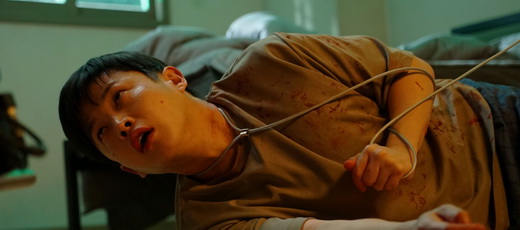 The winner of the Korean Fantastic Best Picture Award at the 2022 Bucheon Fantastic Film Festival, Body Parts is unabashedly jam-packed with a bucketful of genre conventions and, yes, clichés, but at the same time fully committed to giving the viewers, especially horror mavens, exactly what they want, in a slam-bang manner reminiscent of such recent medium-budget, high-concept South Korean chillers as Gonjiam: Haunted Asylum and Horror Stories. Of course, this being an anthology film, some of its segments are inevitably more effective than others.
The winner of the Korean Fantastic Best Picture Award at the 2022 Bucheon Fantastic Film Festival, Body Parts is unabashedly jam-packed with a bucketful of genre conventions and, yes, clichés, but at the same time fully committed to giving the viewers, especially horror mavens, exactly what they want, in a slam-bang manner reminiscent of such recent medium-budget, high-concept South Korean chillers as Gonjiam: Haunted Asylum and Horror Stories. Of course, this being an anthology film, some of its segments are inevitably more effective than others.
"The Reek" is the most predictable among the five segments: despite some good acting by the leads including the K-pop star Han Sang-hyuk, a.k.a. Hyuk from VIXX (and a shockingly disgusting makeup effect on Da-hee's character), it is marred by unimaginative visualization of the supernatural forces. "The Former Resident" has some good atmosphere to spare, with an impressive use of widescreen vistas to emphasize foreboding, dark corners of an apartment, but has little new to add to the haunted-house subgenre. "The Boy Who Can See the Ghost" is the middling entry, perhaps most enthusiastic in its deployment of scaremongering tactics and most colorful in its presentation of supernatural entities, although any decent horror film fan would be able to anticipate its "surprise" ending miles away. The wraparound segment is also efficiently realized, with some amusing nods to horror classics such as Hellraiser, even though Si-kyung's character is essentially a cipher and the big climax in which the cult leader is finally resurrected turns out to be a bit of a letdown.
The two superior segments are hands-down "Exorcism.net" and "String." The former, written and directed by G' Sam a.k.a. the TV actress Ahn Mi-na (Dr. Brain, 18 Again), in synopsis reads like a low-rent version of a Saturday Night Live sketch comedy. Surprise, surprise, it is revealed as one of the best satanic-possession-themed horror films (feature or short) I have encountered in quite some time: non-ironic, fast-paced, crisply directed and edited, the segment in twenty minutes or so manages to pack in nearly all elements we expect to see in a work of the Catholic exorcism subgenre, culminating in a doozy of a surprise ending that actually makes a strong point about untrustworthiness of parental authorities. "String," in a different vein but with an equal level of gumption, entirely does away with expository writing and character development and forges ahead with its almost abstractly surreal setup. It intelligently uses the glaring absurdity of its premise to its advantage, reaching a form of cynical, punk lyricism by its borderline Brechtian but undeniably chilling denouement.
These two episodes by themselves are certainly worth the price of admission, but even taking into consideration the weaker or more predictable segments, Body Parts demonstrates why South Korean cinema is currently a go-to place for a red-meat horror film that delivers on its promises. It is highly recommended for horror fans of any stripe, except for perhaps those for whom anything less austere and cerebral than, say, Midsommar or Sator is considered beneath their taste. (Kyu Hyun Kim)
*This review is based on a print submitted for screening at the 2022 Bucheon Fantastic Film Festival. It may be different from a theatrical release version.
Hong-hwa (Seo Hyo-rim, best known for TV dramas Scent of a Woman, Sunggyungwan Scandal and It's My Life) is a struggling artist with a secret superpower. As an unintended side effect of a sleep medication trial supervised by an ambitious researcher (K-pop group April's Yoon Chae-gyung), she is capable of infiltrating dreams of other sleeping humans. Hong-hwa has come to count this newfound ability as a blessing, given that it allowed her to keep contact, however tenuous and ephemeral, with her dying and comatose father. However, when Hong-hwa attempts to locate her missing best friend by means of accessing the latter's dreams, she finds out to her terror that the kidnapper, Jae-in (Oh Ji-ho, Man on High Heels, Sector 7), can also enter into and manipulate the dreams of others. Moreover, Jae-in, instead of regarding Hong-hwa just as another female prey, is intrigued and pleased to find another person with the same superpower and begins a subtle game of cat-and-mouse to prove that he and she are two peas in a pod— capable of using their powers for selfish, destructive ends: after all, killing a hateful client or an obnoxious neighbor in your dream would be psychologically cathartic yet perfectly harmless in real life— or is it?
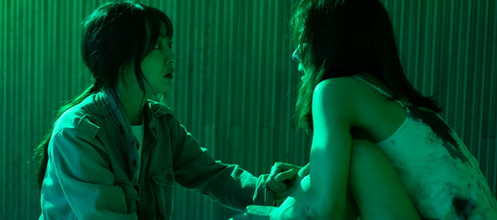 In Dream, directed by Shin Jae-ho, a seasoned screenwriter responsible for Ditto and The Clue, feels at first sight awkwardly cobbled together from the premises and plot elements found in some well-known genre films, most notably Inception and The Cell. Moreover, the serial-killer-related materials employ the type of dank, awash-in-sickly-green-light visuals and a scuzzy, malevolent suburban-abattoir aesthetic that has become overly familiar in Korean cinema at least since The Chaser, including one jarringly graphic sequence of murder that rather pointlessly reminds the viewers of not only Na Hong-jin's debut feature but also the notorious I Saw the Devil. I would not exactly call In Dream an expectation-defying tour de force: it obviously suffers from both limited production resources and the lack of originality.
In Dream, directed by Shin Jae-ho, a seasoned screenwriter responsible for Ditto and The Clue, feels at first sight awkwardly cobbled together from the premises and plot elements found in some well-known genre films, most notably Inception and The Cell. Moreover, the serial-killer-related materials employ the type of dank, awash-in-sickly-green-light visuals and a scuzzy, malevolent suburban-abattoir aesthetic that has become overly familiar in Korean cinema at least since The Chaser, including one jarringly graphic sequence of murder that rather pointlessly reminds the viewers of not only Na Hong-jin's debut feature but also the notorious I Saw the Devil. I would not exactly call In Dream an expectation-defying tour de force: it obviously suffers from both limited production resources and the lack of originality.
However, the film is not without its virtues: chief among them is its rather interesting characterization of the main villain. Instead of portraying Jae-in in a witlessly conventional manner as a grinning psychopath or an overgrown school bully (usually) with mommy issues, Shin and Oh choose to illustrate his dream-penetrating power as a form of addiction. Jae-in is neither a simplistic misogynist nor a sadist, but someone whose "guilt-" and "consequence-free" pursuit of petty vengeance and even vigilante justice has come to increasingly dominate his consciousness, and ultimately his waking life. Unlike the slick Hollywood SF film such as The Cell, wherein the monstrous villain's fractured self is merely used as a plot device, In Dream directly confronts the allure of an addiction to the kind of illusory sense of freedom generated from indulging in acts of immoral violence without having to face their real-life consequences. The academically inclined might be tempted to read in this another metaphor for our act of taking pleasure in watching violent movies featuring morally objectionable acts.
In my view, it could have been far more interesting had the filmmakers conceived Jae-in as a dangerously sympathetic figure, perhaps a "morally ambiguous" super-hero whose destructive actions and rationalizations of them provide a truly substantive challenge to the protagonist's moral compass. Even though they ultimately resort to the type of "surprise" twist-ending that most perceptive viewers could easily predict, Hong-hwa's dilemmas are addressed neither in the aggressively moralistic, sub-Twilight Zone mode (The bad guy is now stuck in his dream-hell forever! She is tearfully reunited with her father in a heavenly nursing home!), nor in a "tastefully ambiguous" "artistic" denouement that evades narrative resolution in favor of belaboring some philosophical point.
In Dream could have benefitted from either a bigger production budget or a team of conceptual artists who could have brought some color and pizzazz to visualization of the dreamscape. In addition, I have the impression that director Shin speeds things up a bit too much, as the film moves into the fourth quarter, with the exposition and plot developments coming at the viewer at a frantic rather than vigorous pace. Still, I have enjoyed the film, flaws and all, and I recommend it to fans of Korean genre cinema with some calibrated expectations. (Kyu Hyun Kim)
*This review is based on a print submitted for screening at the 2022 Bucheon Fantastic Film Festival. It may be different from a theatrical release version.
Set in a snowbound, semi-isolated mountain town, the film starts with two women arriving at a hospital frantically driving a white car. The more heavily injured one slips into coma, with both hands damaged by heavy blows and bleeding from a knife wound in the abdomen. The other, Do-gyung (veteran TV actor Jung Ryeo-won, also in Castway on the Moon, Pain and Gate), alarmingly disheveled and incoherent, claims that the wounded woman is her older sister. The latter had apparently visited Do-gyung, a reclusive mystery writer, to introduce her fiancé, who turned out to be a vicious misogynist and near-fatally attacked his wife-to-be. A stalwart local cop, Hyun-joo (theater actor Lee Jung-eun, best known for playing the housemaid with a secret for the wealthy Park family in Parasite), investigates but immediately smells a rat. Not only is Do-gyung's story about the wounded woman being her sister fabricated, the latter's supposed fiancé turns out to be a criminal with a long rap sheet, yet his whereabouts remain unknown. As Hyun-joo peels back layers of lies, half-truths and deliberate misdirection with dogged determination, she becomes increasingly unsure about whose narrative to trust and who is exactly responsible for what. Is Do-gyung, clinically diagnosed as a schizophrenic, telling the truth about what had transpired in her cabin? What exactly was the relationship between two women?
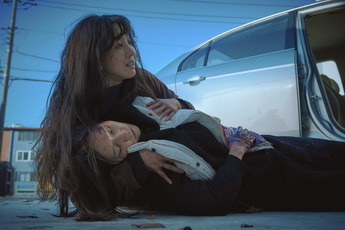 A feature film debut by Christine Hyejin Ko, a former Vancouverite who previously worked for JTBC-Netflix TV dramas such as Forecasting Weather and Love and Law School, directing a screenplay by Seo Ja-yeon (the TV drama Diary of a Prosecutor, among other works), Woman in the White Car is a robust, classically-flavored murder mystery that deftly utilizes almost every item in a bag of tricks available for this genre: an unreliable narrator (in fact several unreliable narrators), multiple flashbacks that reveal different hues of meaning each time they are replayed, hidden motivations of the characters subtly hinted in their throwaway dialogues, a sharply observant detective with a psychological trauma of her own, and carefully laid out artifacts that function as critical clues—a tire-mending equipment, a nondescript nail. In terms of tonality, the film harkens back to the Korean adaptations of the contemporary Japanese mystery novels, most notably those of Higashino Keigo.
A feature film debut by Christine Hyejin Ko, a former Vancouverite who previously worked for JTBC-Netflix TV dramas such as Forecasting Weather and Love and Law School, directing a screenplay by Seo Ja-yeon (the TV drama Diary of a Prosecutor, among other works), Woman in the White Car is a robust, classically-flavored murder mystery that deftly utilizes almost every item in a bag of tricks available for this genre: an unreliable narrator (in fact several unreliable narrators), multiple flashbacks that reveal different hues of meaning each time they are replayed, hidden motivations of the characters subtly hinted in their throwaway dialogues, a sharply observant detective with a psychological trauma of her own, and carefully laid out artifacts that function as critical clues—a tire-mending equipment, a nondescript nail. In terms of tonality, the film harkens back to the Korean adaptations of the contemporary Japanese mystery novels, most notably those of Higashino Keigo.
Although Woman's narrative is rather convoluted, director Ko and screenwriter Seo do an admirable job of keeping the viewers emotionally invested in the main characters and interested in unraveling the film's central mystery. Contributing significantly to the film's effectiveness is solid performances delivered by Jung Ryeo-won and Lee Jung-eun. Jung, who won Korean Fantastic Actor Award for her colorful turn as Do-gyung, is believably intelligent without undermining her vulnerability or mugging the camera for viewer sympathy. Lee firmly anchors the film portraying with crisp restraint a tough but compassionate detective whose gestures of understanding and empathy toward Do-gyung never come off as forced. However, the film's climactic revelations (there are several of them, piled on top of one another, thankfully never confusing) are somewhat marred by one of the chronic problems of contemporary Korean TV dramas and movies, those female characters who cannot roll out "dry" or "cool" dialogue without sounding awkward and stilted.
Overall, the film lacks flamboyance or a distinctive aesthetic appeal of a top-grade mystery thriller such as Park Chan-wook's just-released Decision to Leave, despite some striking touches such as switching aspect ratios as the film moves back and forth from a present-tense narrative to a flashback. Its pleasures stay mostly within the comfort zone demarcated by a murder-mystery genre, which might not necessarily be a bad thing for its aficionados. Still, I was pleasantly surprised by the level of emotional power the film managed to generate over its resolution, overtly melodramatic touches and a few unlikely plot developments notwithstanding. Instead of treating Woman's mystery plot as a gimmick to hook the viewers, Ko and Seo focus on the highly convincing (probably even more so in real life) combination of spiritual desperation and calculating intelligence that underlie the motivations of their female protagonists. The end product of their approach is an enjoyable brain-twister with a strong feminist (most importantly in the sense of women taking control of their lives) overtone that nonetheless does not belabor its point, likely to leave most viewers, especially female mystery fans (I think there are quite a lot of them, especially in the Asian market), emotionally satisfied as well. (Kyu Hyun Kim)
Yoo Min-ho is a good-looking young entrepreneur who has married into a family that owns a massive business conglomerate. Honored as IT Businessman of the Year, he looks to be leading a charmed life, until the police find him in a locked hotel room with the murdered body of his former mistress. The story explodes in the press, but Min-ho insists that he didn't kill her, and that the facts will prove him innocent. Luckily, he can afford to hire a top-level defense attorney to frame those facts in the best possible light.
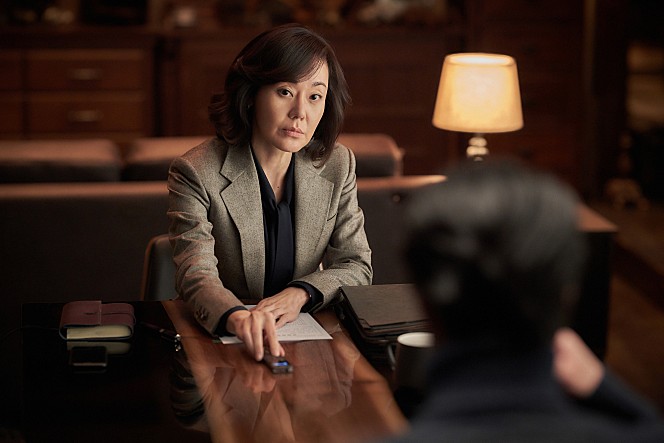 Confession takes place over the course of one long night, with many flashbacks to the events that led to Min-ho's arrest. Thanks to some strings pulled on his behalf, Min-ho has been released on bail, and so he drives to a remote cabin to escape the press. But the defense attorney he has chosen wants to talk to him in person before deciding if she will represent him. She arrives at his cabin, and asks him to tell her what really happened.
Confession takes place over the course of one long night, with many flashbacks to the events that led to Min-ho's arrest. Thanks to some strings pulled on his behalf, Min-ho has been released on bail, and so he drives to a remote cabin to escape the press. But the defense attorney he has chosen wants to talk to him in person before deciding if she will represent him. She arrives at his cabin, and asks him to tell her what really happened.
An official remake of the acclaimed 2016 Spanish thriller Contratiempo (The Invisible Guest), Confession is a story with many false bottoms and interlocking parts. Plots like this can easily fall apart if they aren't well structured and executed, but writer-director Yoon Jong-seok (Marine Boy) has created a highly entertaining film that works on all levels. It is as fun and stimulating as it is fascinating to pick apart.
The film also benefits from some really impressive performances. So Ji-sub is an actor who seems to be cast with equal frequency as a dreamy romantic lead (as in the melodrama Be With You) or as a dark, violent criminal (as in The Battleship Island). Here he is well-suited for a role where the audience is constantly trying to figure out if he is guilty or innocent. K-pop star Nana (from the group After School) shines in a smaller but equally dynamic performance as Min-ho's doomed mistress Se-hee. In some ways, she is the acting discovery of this film. But it is the role of the attorney, played by Kim Yun-jin (ABC series Lost) that is most likely to stick in viewers' memories. We ultimately experience this film through her eyes, and her precise and powerful performance carries us through to the final scene.
Remakes have become an unstoppable trend in the Korean film industry in recent years, with major production companies snapping up the rights to both famous and obscure films from around the world. At first glance, one might think of it as a worrying sign that the industry is running low on fresh ideas. But that doesn't seem to be what is happening in contemporary Korean cinema. In this case, even viewers who have seen the original Contratiempo may find much to enjoy as they watch Confession. (Darcy Paquet)
Su-kyung lives in a small apartment with her daughter Yi-jung, who's in her twenties. To say that the two women don't get along would be a vast understatement. Su-kyung, aggressive and loud, berates and humiliates her daughter at every opportunity. Yi-jung is painfully withdrawn, her face partially hidden behind long strands of hair, but the simmering hate she feels for her mother comes through in her shaking voice. One day things go from bad to worse when, in the midst of a confrontation in a parking lot, Su-kyung hits her daughter with the car. She insists it was an accident, but Yi-jung is furious, and resolves to take the matter to court.
Among the Korean films that premiered at the 2021 Busan International Film Festival, The Apartment With Two Women was the one that had everyone talking. It's an intense viewing experience to be sure, with its claustrophobic mood never once easing up over its 140 minute running time. But its originality speaks for itself, and the film leaves you with many questions to ponder.
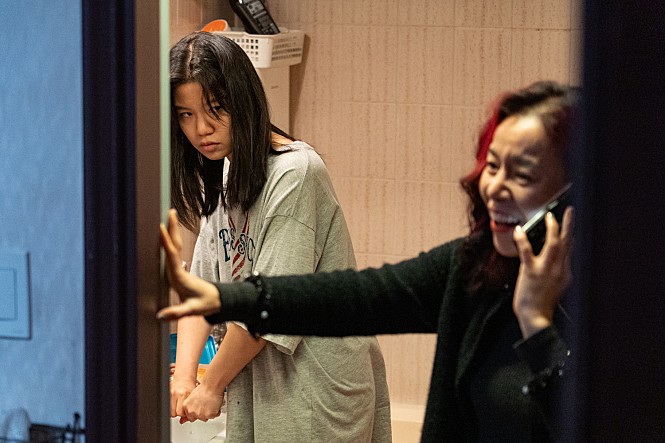 It appears at first glance to be a story about abuse. Our sympathies naturally align with Yi-jung when we see the oppressive and cruel way that her mother treats her. But as the story progresses, we realize that the film is showing us a great deal more. Each of the women need space and freedom from each other more than anything, but circumstances always seem to prevent it. Su-kyung is in a relationship with a genial, supportive man, and she hopes to move in with him. But tensions arise with the man's teenage daughter. Yi-jung too looks to one of her work colleagues for support, but in many ways, Yi-jung is a difficult person to help.
It appears at first glance to be a story about abuse. Our sympathies naturally align with Yi-jung when we see the oppressive and cruel way that her mother treats her. But as the story progresses, we realize that the film is showing us a great deal more. Each of the women need space and freedom from each other more than anything, but circumstances always seem to prevent it. Su-kyung is in a relationship with a genial, supportive man, and she hopes to move in with him. But tensions arise with the man's teenage daughter. Yi-jung too looks to one of her work colleagues for support, but in many ways, Yi-jung is a difficult person to help.
There seems to be something self-reinforcing about the ways that Su-kyung and Yi-jung suffocate each other. The reasons they can't escape that cramped apartment are partly economic, but perhaps mostly psychological. The film's Korean title, "Two Women Who Wear the Same Underwear," vividly captures the sense of unwanted intimacy that ties them together.
The contributions of actors Yang Mal-bok (Su-kyung) and Lym Ji-ho (Yi-jung) are a major part of this film's success. Actors often draw off of each other's energy while performing, but in this work, the energy projected by each actor is entirely contradictory. Both performances are remarkable, but it's the combination of the two performances which seems particularly impressive. It's like fire and ice violently colliding over the course of the film, with one never weakening the other.
Debut director Kim Se-in shows a great eye for detail, and she understands when to let images speak for themselves. Deliberately avoiding the standard rhythms of storytelling, she pushes the story forward quickly at times, and at other times slows down to let an image or a mood take precedence. The overall effect is powerful and unsettling. It will be exciting to see what films she shoots next. (Darcy Paquet)
The year is 1645, and King Injo sits on the throne. His reign has been anything but peaceful, having lived through a major rebellion and two invasions (viewers who have watched director Hwang Dong-hyuk's The Fortress, in which the Korean king is forced to prostrate himself before the Qing Emperor, will know the backdrop to this story). Now his son the Crown Prince Sohyeon is set to return to Korea after living 8 years as a hostage with the Qing. But Injo is skeptical about his son's return; he suspects that in the intervening years, his son's loyalties may have turned.
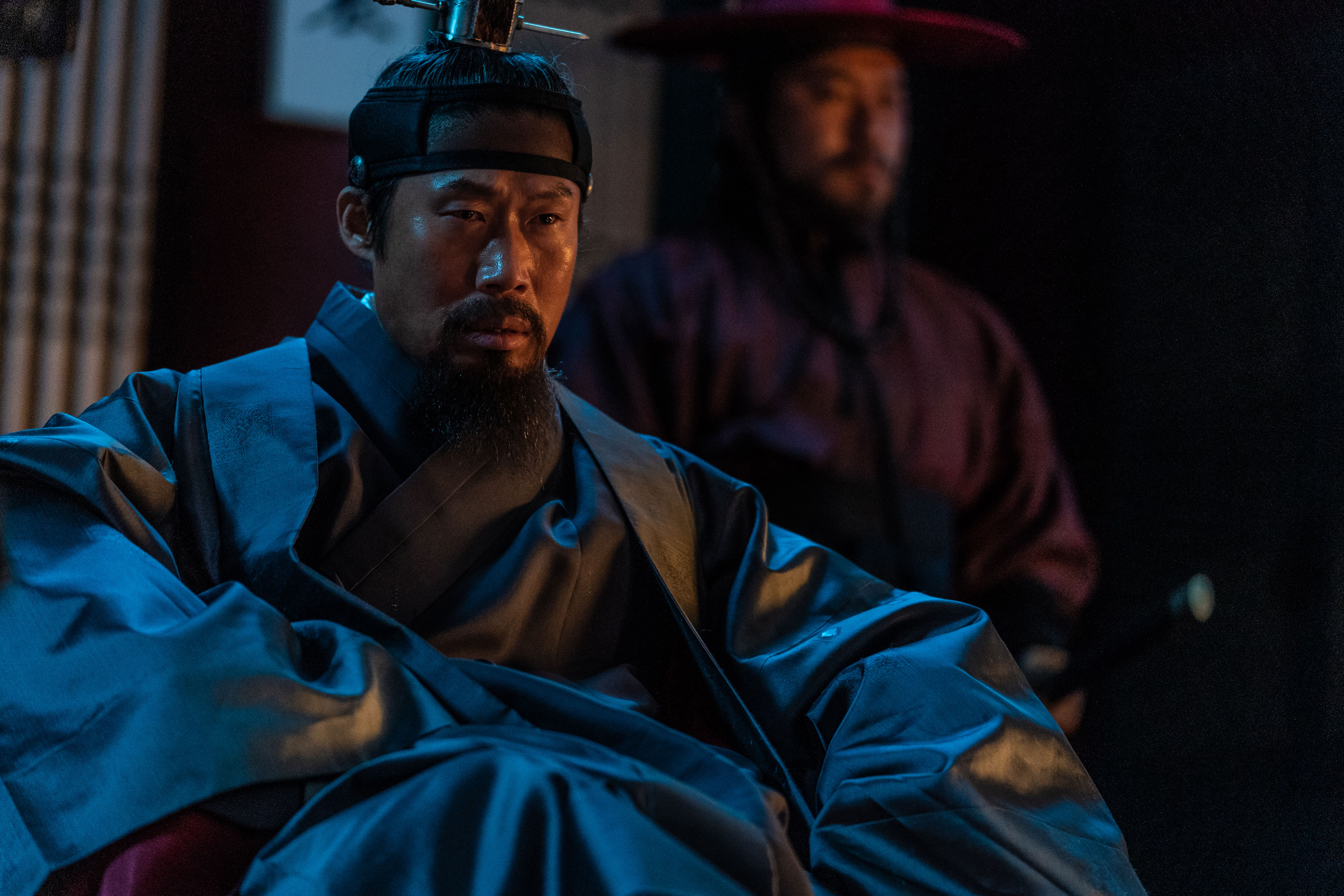 Meanwhile Gyeong-su, a gifted acupuncturist from a small village, has been chosen to live in the palace and serve the royal family. Gyeong-su is blind, or at least everyone assumes that he is. To be precise, he has a condition known as hemeralopia (day blindness), in which he is completely unable to see in daylight, but able to make out a fair amount in the darkness. Life experience has taught him that this condition makes people feel suspicious, and so he lives his life pretending to be fully blind.
Meanwhile Gyeong-su, a gifted acupuncturist from a small village, has been chosen to live in the palace and serve the royal family. Gyeong-su is blind, or at least everyone assumes that he is. To be precise, he has a condition known as hemeralopia (day blindness), in which he is completely unable to see in daylight, but able to make out a fair amount in the darkness. Life experience has taught him that this condition makes people feel suspicious, and so he lives his life pretending to be fully blind.
With his superior acupuncture technique and keen understanding of people, Gyeong-su adjusts well to his new job. He even begins to open up to the charismatic Prince Sohyeon. But then Gyeong-su witnesses a crime that he should never have seen. For his own protection he must remain silent, but what he knows is too explosive to keep to himself.
The Night Owl surprised viewers when it opened in November 2022. Although it looks in some ways like a typical palace-set historical drama, it is shot with a more contemporary energy, like a thriller. Gyeong-su's visual impairment gives the filmmakers an opportunity to create a very distinctive look for the night scenes, and in general, this is a beautifully-shot work. More than anything, the story is gripping and well-told. Gyeong-su is a very likeable and capable protagonist, caught in a challenging and dangerous situation. And first-time director Ahn Tae-jin (who served as the assistant director on Lee Joon-ik's 2005 blockbuster hit King and the Clown) capably squeezes every last bit of drama out of this this explosive setup. In a year when mid-sized films suffered horribly at the box office, The Night Owl rode positive word of mouth to sell 3.3 million tickets. In that sense, this film was a rare beacon of optimism for Korean cinema in 2022.
Finally, no review of The Night Owl can pass without some appreciation for what Yoo Hai-jin was able to achieve in his depiction of King Injo. In Korea's film and TV industries, there are certain kind of actors who are given the opportunity to play kings. Yoo Hai-jin is not of that type. His acting skills are often praised, and yet he is usually cast in comic roles. When he takes on more serious dramatic films, he often plays relatable characters who elicit our sympathy in some way. So Director Ahn deserves praise for recognizing that Yoo is more than capable of playing a character who evokes grandeur, power and cruelty in equal measure. Despite the fact that we already know him so well, Yoo's performance ranks as one of the biggest acting discoveries of 2022. (Darcy Paquet)